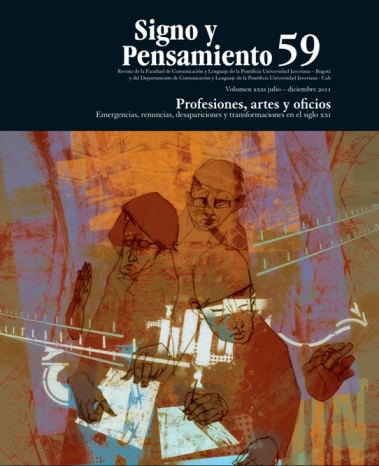Abstract
This article intends to recover some of the key ideas of Marshall McLuhan, and to relocate them from some not well-known and little discussed passages of his works. The first part is devoted to the ideas of environment and anti-environment, and to the possibility of thinking beyond the traditional versions that conceive the idea of environment -developed by McLuhan- and the simpler idea of communication environment as synonyms. From an ecological perspective, the second part explores some of the key concepts for the understanding of the works of the Canadian author (such as probe and cliché) and proposes a reading of the central ideas of his thinking in terms of a transductive relation between men and technique.
Ihde, D. (1990), Technology and the Lifeworld. Form Garden to Earth, Indianápolis, Indiana University Press.
Kattan, N. (1972), “Marshall McLuhan”, en AA. VV., Análisis de Marshall McLuhan, traducción de Alejandro Ferreiroa, Buenos Aires, Tiempo Contemporáneo, pp. 9-25.
Marchessault, J. (2005), Marshall McLuhan, Londres, Sage.
McLuhan, M. (1966), “The Emperor’s Old Clothes”, en Kepes, G. (ed.), The Man-Made Object, Nueva York, George Brazillier, pp. 90-95.
— (1969), Contraexplosión, traducción de Isidoro Gelstein, Buenos Aires, Paidós. — (1985), La Galaxia Gutenberg: génesis del “Homo Typographicus”, traducción de Juan Novella, Madrid, Aguilar.
— (1996), Comprender los medios de comunicación. Las extensiones del ser humano, traducción de Patrick Ducher, Barcelona, Paidós.
McLuhan, M. y McLuhan, E (1988), Laws of Media. The New Science, Toronto, Buffalo, Londres, University of Toronto Press.
McLuhan, M. y Powers, B. R. (2005), La aldea global, traducción de Claudia Ferrari, Barcelona, Gedisa.
McLuhan, M. y Stearn, G. E. (1973), McLuhan: caliente y frío, traducción de Horacio Laurora, Buenos Aires, Sudamericana.
McLuhan, E. y Terrence Gordon, W. (2005), Marshall McLuhan Unbound, vol. 20, Corte Madera, CA, Ginko Press.
McLuhan, M. y Watson, W. (1970), From Cliché to Archetype, Nueva York, The Viking Press.
Ong, W. (1982), Oralidad y escritura. Tecnologías de la palabra, México: FCE. Traducción de Angélica Sherp.
Platón (2002), “Fedro”, en Diálogos, vol. III, introducción, traducción y notas de E. Lledó Íñigo, Madrid, Gredos.
Santos, M. (2002), A Natureza do Espaço. Técnica e Tempo. Razão e Emoção, São Paulo, Editora da Universidade de São Paulo.
Terrence Gordon, W. (2005), McLuhan para principiantes, traducción de Guillermo Sabanes, Buenos Aires, Era Naciente.
Terrence Gordon, W.; Hamaji, E., y Albert, J. (2007), Everyman’s McLuhan, Nueva York, Mark Batty Publisher.
Wittgenstein, L. (1999), Investigaciones filosóficas, traducción de Alfonso García Suárez y Ulises Moulines, México, UNAM/Crítica.
This journal is registered under a Creative Commons Attribution 4.0 International Public License. Thus, this work may be reproduced, distributed, and publicly shared in digital format, as long as the names of the authors and Pontificia Universidad Javeriana are acknowledged. Others are allowed to quote, adapt, transform, auto-archive, republish, and create based on this material, for any purpose (even commercial ones), provided the authorship is duly acknowledged, a link to the original work is provided, and it is specified if changes have been made. Pontificia Universidad Javeriana does not hold the rights of published works and the authors are solely responsible for the contents of their works; they keep the moral, intellectual, privacy, and publicity rights.
Approving the intervention of the work (review, copy-editing, translation, layout) and the following outreach, are granted through an use license and not through an assignment of rights. This means the journal and Pontificia Universidad Javeriana cannot be held responsible for any ethical malpractice by the authors. As a consequence of the protection granted by the use license, the journal is not required to publish recantations or modify information already published, unless the errata stems from the editorial management process. Publishing contents in this journal does not generate royalties for contributors.


